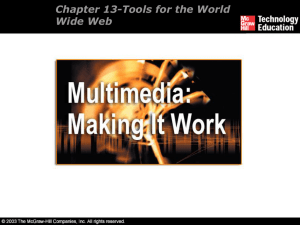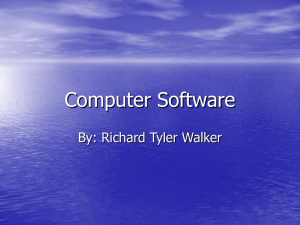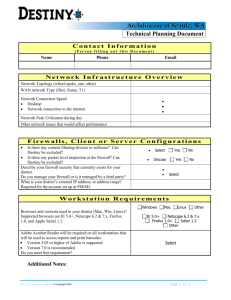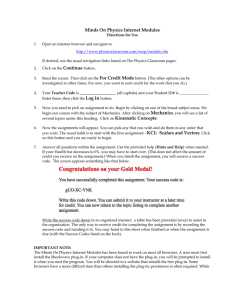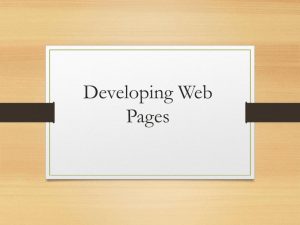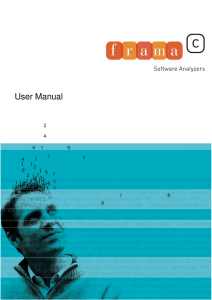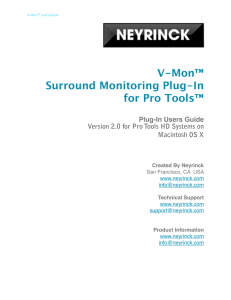COM 205 Multimedia Applications St. Joseph’s College Fall 2004
advertisement
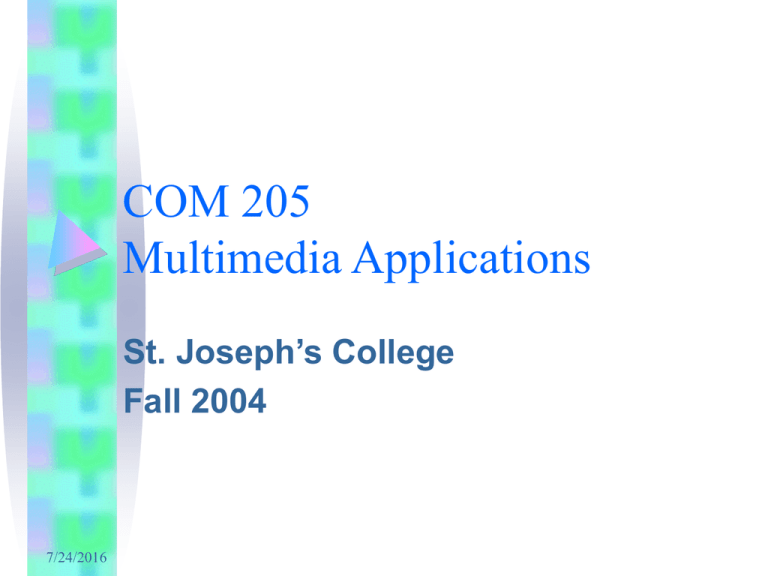
COM 205 Multimedia Applications St. Joseph’s College Fall 2004 7/24/2016 Chapter 13 Tools For the World Wide Web 7/24/2016 Web Servers • 1. The “server” is actually software. • a) Various servers are available that run on various platforms. • b) The most common server packages include – (1) Apache – (2) Microsoft Internet Information Services (IIS) – (3) iPlanet Web Servers • 2. The server plays a pivotal role in content delivery. • 3. The speed and capacity of the server has a major effect on performance. – a)This is especially true when the server is delivering streaming content. – b)Speed and capacity is affected by the server hardware. – c) Plan carefully for capacity. Web Page Makers and Site Builders • A. Learn HMTL • 1. Although site building tools seem to remove the need to learn HTML, some knowledge is still important. • 2. An HTML document can be created or edited using only a text editor. • B. Site building tools • 1. Various tools help you create Web pages in a WYSIWYG editing environment. • 2. The markup created by editors is often complicated and bloated. • 3. Inspite of this, these tools can be timesavers. Web Page Makers and Site Builders • 4. Common site building tools include – a)Adobe GoLive – b)Macromedia Dreamweaver – c) Microsoft FrontPage – d)Myrmidon – e) Netscape Composer • C. HTML translators • 1. Many programs such as word processors incorporate HTML translators. • 2. The markup created by translators is often bloated and proprietary. Web Browsers • 1. The most common Web browsers are – a) Internet Explorer • (1) The AOL “browser” uses Internet Explorer as its enabling technology. – b) Netscape Navigator • (1) Paradoxically, AOL Time Warner now owns Netscape. • (2) Netscape recently released version 6, but its market share still pales to Internet Explorer’s. • 2. Some alternate browsers, are – a)Opera – b)Emacs – c) iCab Web Browsers • 3. Web browsers have increasingly grown to support plug-in technologies such as FLASH and Java. • 4. Web browsers often vary from the HTML standards. – a)Support for features such as cascading style sheets (CSS) is inconsistent The majority of visitors to your web site will be using Internet Explorer or Netscape with plugins. You should be sure that your content looks good in both of them. Web Browsers and Plug-Ins • Plug-ins and delivery vehicles • 1. Plug-ins add capabilities to the Web browser. – a)Plug-ins are also sometimes called helper applications. • 2. If your content requires a plug-in, don’t forget that users must have the plug-in installed. – a)Provide a link to help the user obtain the plug-in. – b)Decide whether requiring a plug-in is worthwhile. • 3. Types of plug-ins include – a)Text ( such as Adobe Acrobat Reader) – b)Images ( such as Macromedia Shockwave which allows the display of vector graphics. Web Browsers and Plug-Ins • Plug-Ins – c) Sound • Plug-ins such as RealPlayer, QuickTime, and Windows Media Player can play music. – d)Animation, video, and presentation • 1. RealPlayer, QuickTime, and Windows Media Player also play animations and video. • (2) Flash and Shockwave are used for animation and presentation. • (3) Microsoft PowerPoint can be used for online presentations Vaughn’s Bandwidth Rule Bandwidth = Satisfaction File size • Satisfaction with the Internet is a function of connection speed and the size of the data elements accessed Beyond HTML • 1. Programming technologies can be used for online content delivery, such as – a)Common Gateway Interface (CGI) programming – b)PERL – d)Java – e) JavaScript – f) PHP Beyond HTML • 2. You can interact online with conferencing tools such as – a)BeingThere – b)CU-SeeMe from White Pine – c) LiveMedia from Netscape – d)Netmeeting from Microsoft • 3. 3-D worlds – (1) Virtual Reality Modeling Language (VRML) – (2) Macromedia Director/Shockwave Player – (3) Apple QuickTime – (4) Java
